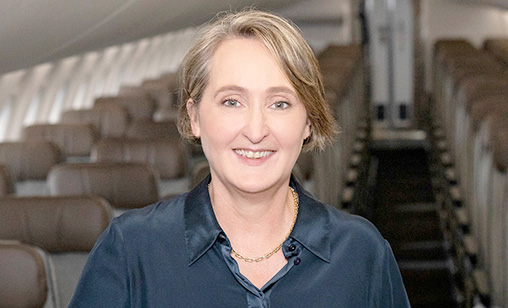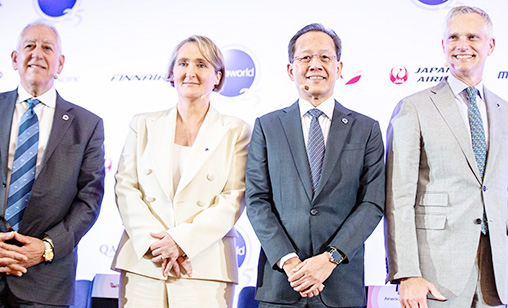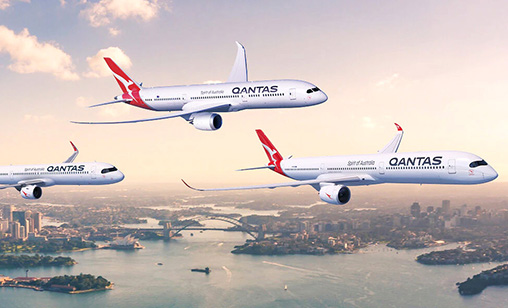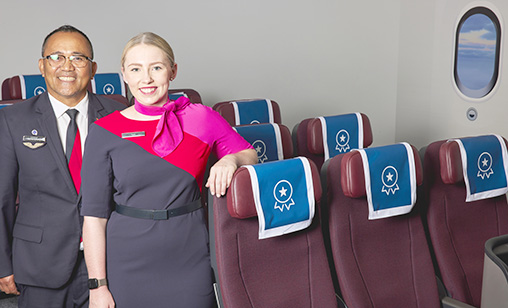Cover Story
Taking time to listen
Is Qantas Airways, its reputation bruised and battered by flight delays, cancellations and poor service on the road to recovery? Yes, says group CEO, Vanessa Hudson. Approaching a year in charge, she believes Australia’s leading airline company is back in business. Associate editor and chief correspondent, Tom Ballantyne, reports.
June 1st 2024
When Vanessa Hudson took charge of the Qantas Group last September the Flying Kangaroo had been losing altitude for months. Read More » She inherited a national flag carrier with a tarnished public image, bombarded by customers angry about flight delays, cancellations and poor service. Now approaching the end of her first year as CEO, Hudson said the airline’s brand image is well on the way to recovery.
“When I stepped into the CEO role, we had a lot of challenges in terms of reputation and trust from the accumulation of things, but particularly the fact we let our customers down in the period after COVID,” she said.
 |
| 'And the one critical thing in repairing [our] reputation, I believe, is we need to be consistent. We need our customers to have experienced multiple positive flights with us so they move from that memory they have had of the poor experience to one where it is positive. And that is when they are going to start to believe and that is when reputation and trust starts to return. That is what we are relentlessly focused on' |
| Vanessa Hudson Qantas Group CEO |
“Our on-time performance, our cancellations were high. It took us too long to recover and what we know, with our customers particularly, is when you have multiple bad experiences, the memory is long.”
The solution, she said, is spending time listening. “What we have done as a leadership team is spend time with our customers listening. I have spent many hours in focus groups with detractors. I am surrounding myself with customers who have had those bad experiences, not customers that are promoters. I think this is really important as leaders,” she said.
Hudson’s strategy appears to be working. Speaking during the International Air Transport Association Annual General Meeting and Aviation Summit in Dubai in early June, she said the company’s on-time performance in May was 80%, way above previous months, with June tracking even higher.
In addition, the group’s MPs, a metric used to measure customer loyalty and satisfaction, have significantly increased domestically this month hitting pre-pandemic levels. At LCC subsidiary Jetstar, she said, they are the highest they ever been.
“I am not saying the job is done. The job is never going to be done. We have to be constantly listening, driving and with continuous improvement.
Her predecessor, Alan Joyce, left under a cloud as criticism of Qantas from the flying public and the airline group’s unions intensified. He departed the airline company earlier than planned following allegations the company continued to sell tickets for cancelled flights - despite its bumper annual profit of $1.13 billion in fiscal 2022-2023.
Once loyal customers accused Qantas of booking the profit at their expense by charging high prices and delivering poor service. Qantas Group chair, Richard Goyder, who is stepping down from the role, said at the time the airline was suffering “an acute loss of trust from the community and accumulated disappointment from customers”.
It was in this volatile atmosphere that Hudson, 53, and a 30-year Qantas veteran, took over. She had been group chief financial officer for four years until taking the top job. Her first task was to find out the key customer pain points. Number one was on-time performance and reliability.
“Secondly, customers said we recognize things won’t go to plan, but when they don’t go to plan, we expect Qantas to recover better than it has. I won’t go over everything we have done, but we have been systematically focusing on those big pain points. I am really pleased to say we are definitely seeing customer satisfaction turn really rapidly,” Hudson said.
 |
In her first financial results announcement in February, for the six months to December 31, 2023, Qantas Group profits were down 13% on pre-tax income of $1.25 billion, or $869 million after tax. The chief driver of the lower earnings was a drop in air fares prices, which wiped $600 million off its balance sheet. Yield from its freight business also dropped by $146 million.
Despite the post-pandemic trauma and the focus on regaining customer confidence, Hudson has plenty of other issues to address. She has to oversee the continuation of the group’s biggest fleet renewal program in its history.
Back in 2022, the airline ordered 12 A350-1000s, critical to its much touted Project Sunrise; the first non-stop route from Sydney to London and New York. It later added 12 more of the type to the order.
Domestically, it announced Project Winton, a renewal of its narrow-body fleet with firm orders for 20 A321XLRs and also 20 A220-300s for regional subsidiary QantasLink. The new airplanes will gradually replace the company’s 737s and ageing 717s.
The orders also include options for 94 aircraft with deliveries to 2034. Last August, Boeing also scored a sale when the group committed to 12 787s. The new Airbus planes have been arriving at Qantas since late 2023.
Asked about the ongoing problems dogging Boeing, Hudson was forthright. “Aviation needs a strong Boeing. As a customer we are very supportive of Boeing on its journey,” she said.
“When I speak to the Boeing leadership team, they are very focused on what needs to be done to address their quality issues. Everything we have heard from Boeing gives me the sense tthey will get on top of it.
“As a customer, we will do whatever we can to support that journey in terms of what I think is important in leadership. There are a number of qualities you need. As a CEO, you must be connected to the front line, be connected with your customers, be connected with your key stakeholders.
 |
“I would suggest that for Boeing they are important qualities to really understand. You know how your organization operates and making sure there is minimal gap from the leadership to the frontline.”
Fleetwise, Qantas has eight of its 10 A380s back in service. The remaining two are completing maintenance checks and are expected to return to commercial flying by year-end. “That’s important for us too because our customers really value the A380 experience. It’s important to have them in the fleet. It also unlocks some frequency upside for us,” she said.
The “star” of the Qantas group’s fleet renewal is undoubtedly Project Sunrise. Scheduled to launch in 2025, the pandemic, delivery delays and certification of a third fuel tank required on the A350 to make the 22-hour flights have delayed its start date.
At IATA in Dubai, Hudson confirmed the extra fuel tank has been approved by the Australian Civil Aviation Safety Authority. “We are working very closely with Airbus. The first aircraft is due to arrive [at Qantas] in mid-2026. It has passed all the certifications now, so we are very optimistic about the delivery time table,” she said.
“We are very excited about Project Sunrise. It is the opportunity for the Qantas Group to use our geographic distance, our home market strength; our expertise in long-haul travel, to chart what we think is a competitive advantage.”
Another development critical for the group’s fleet and network expansion is a historic deal signed between Qantas and Perth Airport in late May. The 12-year agreement involves the airport’s investment of around A$2 billion in new terminal facilities and a new parallel runway. Qantas and Jetstar will relocate all services to a new terminal in the Airport Central precinct that will, along with the airline’s major investment in new aircraft, facilitate the growth required to turn Western Australia into a new major domestic and international “Western Hub” for the Qantas Group.
Qantas Airways and Jetstar plan to add 4.4 million seats to and from Perth annually by the time the new terminal opens in 2031.
Hudson said the deal means Qantas can create a world-class western hub and significantly expand its domestic and international services in the short, medium and long term.
 |
“Perth-London and Perth-Rome are two of the most popular flights in our international network, which gives us confidence in our strategy to ramp up Western Australia flying in the next few years as we receive new aircraft and grow our fleet,” she said.
“With the launch of Perth-Paris in July and Jetstar’s new services into Asia starting later this year, we have a pipeline of growth underway where Perth will be on track to be our second biggest international gateway behind Sydney.”
Potentially, when the A350s and more B787s come online, Qantas carriers can launch more routes to Africa and Europe.
“The narrow-bodies are coming, as are the XLRs. We will be able to enter new markets such as India from Perth, Malaysia, potentially Japan and Singapore. It is just an incredibly exciting opportunity to build that Western hub,”
One problem that is easing, and one that has been impacting airlines globally, is supply chain issues. “We have pretty much seen several supply chain issues resolved,” Hudson said.
“For example, the shortage of spare parts is starting to be resolved. We have progressively built our inventory levels of critical spares that were causing on-time performance issues and cancellations.
“That is almost back to pre-COVID levels. We are feeling pretty good about that. The other area where we are really focused is the supply of important resources, engineering resources.
“We have worked with our government to put the right visa structures in place so we bring our engineering levels back to complement. In terms of engineering manpower, we are actually there now (at pre-COVID levels). We are feeling good about the pipeline of cabin crew and pilots in Australia.”
In all of this, investment in service improvements has been underway. More than $150 million has been spent on improving the customer experience. Another $70 million is being out spent on lounge improvements in Sydney and Auckland and the search is on for a new lounge space at London Heathrow.
In April, the group announced one of its biggest expansions in its frequent flyer scheme. It gives members access to 20 million more reward seats in a new category of rewards seat called Classic Plus.
While usually requiring more points than the existing Classic reward seats, it will be available across more seats on Qantas international and domestic networks. One of the biggest pain points in the Qantas program has been the inability for people to use their points on flight redemptions, particularly long-haul flight redemptions. The program has not been overhauled since 2019.
Hudson said the job will never be done in terms of delivering for customers but another area of her focus is deepening the relationship with the airline’s own people.
“We know they are our most important asset when delivering outcomes for customers. We know our job as leaders is to make sure we serve them the best way we can, delivering what they need to deliver to customers, but also creating an environment that enables them to live their best careers at Qantas,” she said.
“We are very much focused on that, making sure our people feel they have a voice at the table. As a leadership team we back them up.”
Also important is sustainability. “It is the next greatest challenge for aviation, charting the course to reducing emissions and fuel. It is so incredibly important we do that. We keep focused on it,” she said.
Indeed, the Qantas fleet renewal is a major part of its sustainability efforts, with the new generation aircraft bringing vastly improved fuel efficiency and reduced emissions.
One thing Hudson does not fear is competition. “We have more than 50 competitors internationally. So, internationally it is a very competitive market. Domestically as well. We are seeing the competitive market continuing to keep us on our toes and that’s what we like.
“We welcome competition. We are seeing good demand domestically and also internationally, in both the corporate and leisure categories.
“We continue to be optimistic. You can never become complacent with your competitors. You can never take your customers for granted. That’s our mantra as a leadership team.
“I’m not sitting here saying there are not going to be challenges we face as a leadership team. There will. Aviation is a really tough industry. We know that. Geopolitical issues, competitive issues, demand issues, will always be there. We have to be looking around corners, be anticipating issues, keep the business as efficient as possible and as a leadership team, be agile and make the right decisions when needed.”
Nor will she apologize for striving for profits. “I am not going to sit here as a CEO and accept we can’t continue to improve the business for customers, for our people, for our investors. We will always stretch ourselves to ensure we are finding that balance. You know, Project Sunrise is adding an incremental $400 million in earnings investments we are making in the narrow-bodies, the investments we are making in Perth, unlocking new markets, new growth.
“That is all upside for us. Therefore, we are optimistic that as a leadership team we will focus on growing profit sustainably, including profits from loyalty. Being proud about being profitable.
“I don’t apologize for that. I think profitability is going to enable us to invest in our customer experience, invest in reconfiguring our wide-bodies for Wi-Fi and in new aircraft. It will unlock new routes, new cabin experiences. It’s a good thing. It is also good for our people because they get growth.”
qmrjuke20272 qmrjuke20272 says:
January 25th 2026 12:18pm